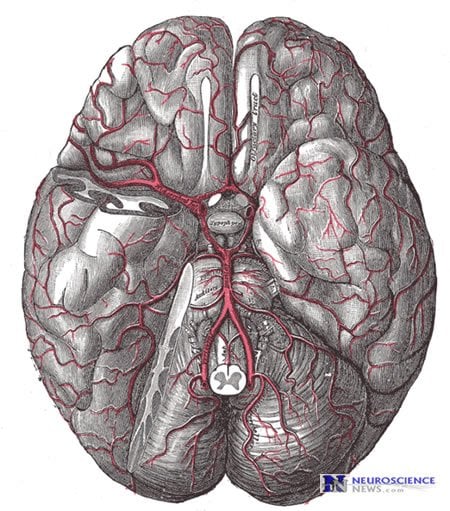Unwanted formation of blood vessels (angiogenesis) in the brain is likely to be the cause of intractable walking and balance difficulties for people who suffer from Parkinson’s disease. This conclusion is supported by new research from Lund University in Sweden.
Many people with Parkinson’s disease eventually experience walking and balance difficulties, despite adequate medication. Moreover, some patients cannot fully take dopamine-based medication, as dopamine can lead to side effects.
The current research findings verify similar data from a previous study by other researchers, which was performed on brain tissue from a small number of deceased patients.
“The strength of our study is the number of participants, and the fact that they are alive. Because many suffer from several parallel diseases at the final stage of their lives, it is difficult to analyse samples from deceased persons”, explains Oskar Hansson, reader at Lund University and consultant at Skåne University Hospital.

The findings, published in the journal Neurology, were made when the researchers used a broad approach when looking for mechanisms to increase understanding of how Parkinson’s disease works. “The measurements showed clear connections between markers of angiogenesis in the brain and walking or balance difficulties among the participants. We also noted an increased permeability of the blood-brain barrier, which leads to blood components potentially leaking into the brain and causing damage”, says Oskar Hansson. The first part of the study included 100 Parkinson’s patients and 38 healthy control persons at Skåne University Hospital in Malmö. Through a cerebrospinal fluid sample, several different proteins that indicate formation of blood vessels in the brain were measured. To ensure the results, two additional groups of patients of approximately the same size were also tested.
“Medication for angiogenesis already exists. If we can confirm our results in further studies, these drugs can be tested on Parkinson’s patients in the future”, says Oskar Hansson.
Before it may be time to test the drugs in clinical studies, Oskar Hansson and his colleagues plan on conducting an animal study, to gain further knowledge about the mechanisms that are believed to cause problems for Parkinson’s patients, and to enable a selection of the most appropriate drugs to use.
The research was conducted in collaboration with the University of Gothenburg (Sweden), the Mayo Clinic in Scottsdale, Arizona (US), and others.
Funding: The studies were made possible thanks to the support from the European Research Council (ERC), Swedish Research Council (VR), Parkinson Foundation in Sweden, MJ Fox Foundation for Parkinson Research, Region Skåne through ALF funding, etc.
Source: Cecilia Schubert – Lund University
Image Source: The image is in the public domain
Original Research: Abstract for “Increased CSF biomarkers of angiogenesis in Parkinson disease” by Shorena Janelidze, PhD, Daniel Lindqvist, MD, PhD, Veronica Francardo, PhD, Sara Hall, MD, Henrik Zetterberg, MD, PhD, Kaj Blennow, MD, PhD, Charles H. Adler, MD, PhD, Thomas G. Beach, MD, PhD, Geidy E. Serrano, PhD, Danielle van Westen, MD, PhD, Elisabet Londos, MD, PhD, M. Angela Cenci, MD, PhD and Oskar Hansson, MD, PhD in Neurology. Published online October 28 2015 doi:10.1212/WNL.0000000000002151
Abstract
Increased CSF biomarkers of angiogenesis in Parkinson disease
Objective: To study biomarkers of angiogenesis in Parkinson disease (PD), and how these are associated with clinical characteristics, blood–brain barrier (BBB) permeability, and cerebrovascular disease.
Methods: In this cross-sectional analysis, 38 elderly controls and 100 patients with PD (82 without dementia and 18 with dementia) were included from the prospective Swedish BioFinder study. CSF samples were analyzed for the angiogenesis biomarkers vascular endothelial growth factor (VEGF); its receptors, VEGFR-1 and VEGFR-2; placental growth factor (PlGF); angiopoietin 2 (Ang2); and interleukin-8. BBB permeability, white matter lesions (WMLs), and cerebral microbleeds (CMB) were assessed. CSF angiogenesis biomarkers were also measured in 2 validation cohorts: (1) 64 controls and 87 patients with PD with dementia; and (2) 35 controls and 93 patients with neuropathologically confirmed diagnosis of PD with and without dementia.
Results: Patients with PD without dementia displayed higher CSF levels of VEGF, PlGF, and sVEGFR-2, and lower levels of Ang2, compared to controls. Similar alterations in VEGF, PlGF, and Ang2 levels were observed in patients with PD with dementia. Angiogenesis markers were associated with gait difficulties and orthostatic hypotension as well as with more pronounced BBB permeability, WMLs, and CMB. Moreover, higher levels of VEGF and PlGF levels were associated with increased CSF levels of neurofilament light (a marker of neurodegeneration) and monocyte chemotactic protein–1 (a marker of glial activation). The main results were validated in the 2 additional cohorts.
Conclusions: CSF biomarkers of angiogenesis are increased in PD, and they are associated with gait difficulties, BBB dysfunction, WMLs, and CMB. Abnormal angiogenesis may be important in PD pathogenesis and contribute to dopa-resistant symptoms.
“Increased CSF biomarkers of angiogenesis in Parkinson disease” by Shorena Janelidze, PhD, Daniel Lindqvist, MD, PhD*, Veronica Francardo, PhD, Sara Hall, MD, Henrik Zetterberg, MD, PhD, Kaj Blennow, MD, PhD, Charles H. Adler, MD, PhD, Thomas G. Beach, MD, PhD, Geidy E. Serrano, PhD, Danielle van Westen, MD, PhD, Elisabet Londos, MD, PhD, M. Angela Cenci, MD, PhD and Oskar Hansson, MD, PhD in Neurology. Published online October 28 2015 doi:10.1212/WNL.0000000000002151






